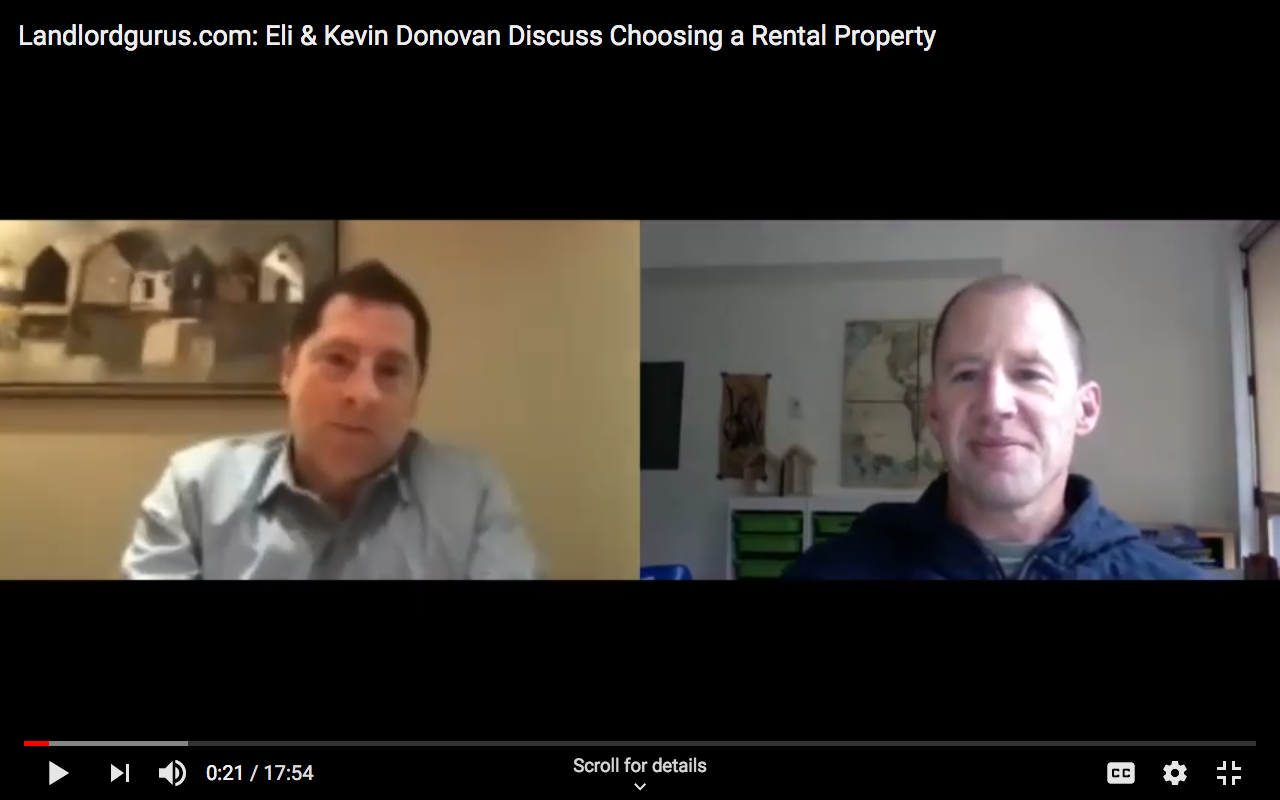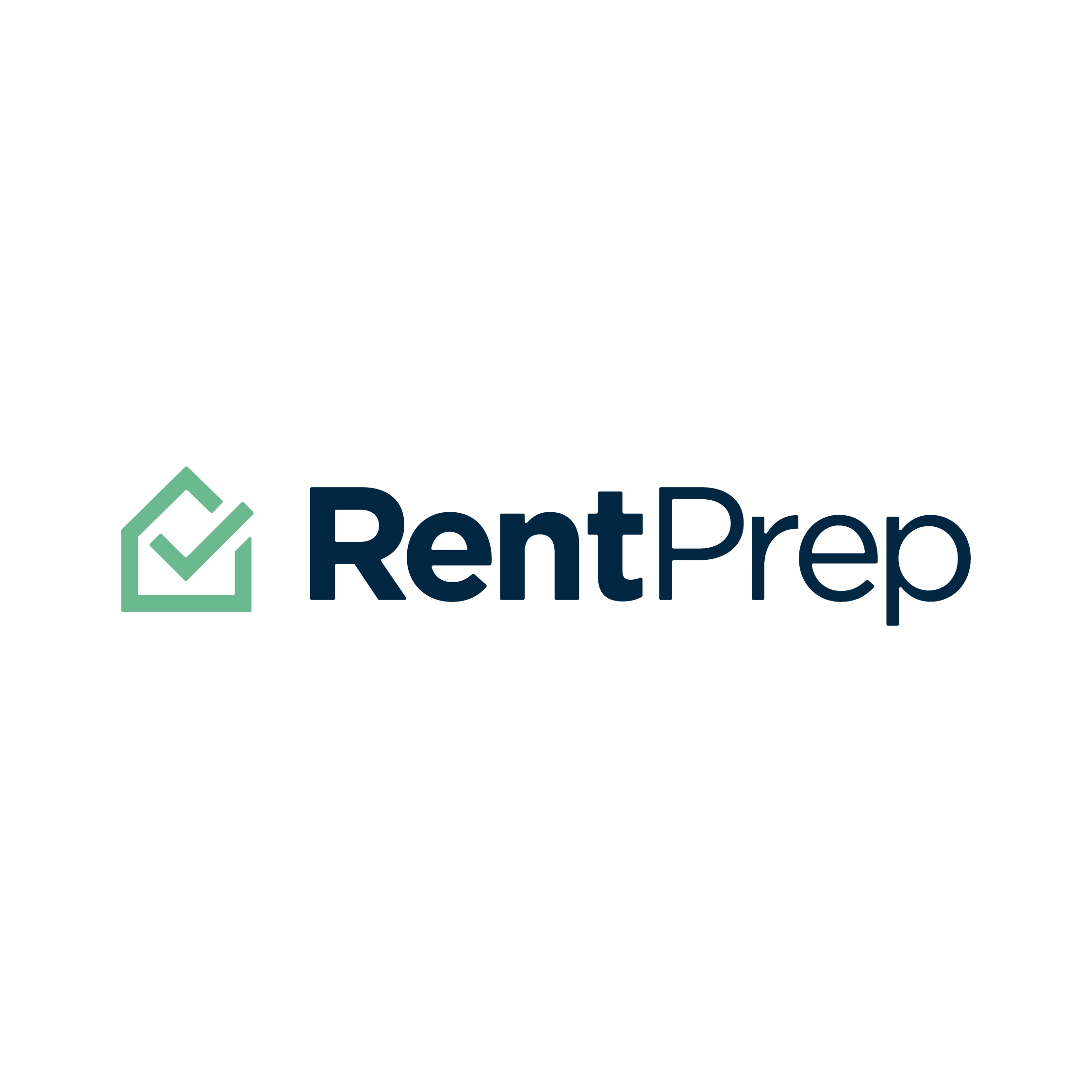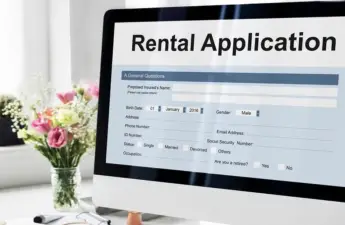Eli talks with Kevin Donovan about his extensive experience helping clients find investment properties that meet their personality, their strengths, their goals, and their risk tolerance.
Raised in the Seattle area, Kevin Donovan is a Managing Broker with Windermere Real Estate. He has successfully closed hundreds of residential and commercial real estate transactions around the greater King County in his twenty-seven year career. Clients know they can count on Kevin to be ethical, honest, responsive. In addition to his guest appearance on Landlord Gurus ,Kevin has also been featured on HGTV’s “House Hunters”.
Our Interview:
Eli: Hello, I’m Eli from Landlord Gurus. Today I am talking with Kevin Donovan. He’s a Managing Broker with Windermere Real Estate here in Seattle, Washington. Today we’re going to talk about his experience in helping buyers find great rental properties. Good morning, Kevin.
Kevin: Good morning, Eli. And thanks for having me. How are you doing?
Eli: Doing fine thanks.
Kevin: So just to give you a little background on myself, I’ve been selling real estate for Windermere Real Estate since 1993. As of now, that puts me at about 27 years experience. In fact, I think I’ve helped you and your wife find a house and I think I’ve helped you find a rental property. So the good news is we’ve worked together. So you know how I do things.
Also Read: Residential Lease Agreements: Best Software for Small Landlords
Eli: Yeah. For several years now. You’ve successfully guided us to find great properties; both our single family home and a rental here in our neighborhood. So I’m wondering, just to start off, how you start when somebody like me, for example, comes to you saying they want to find a residential investment property. What questions do you ask them before you get started?
Kevin: That’s a really good question. And typically I do have a lot of questions when somebody is looking for a rental income property. The first thing I like to ask is whether they own any rental properties already. I like to know what their experience level is. Secondly, where are they now? And the reason I ask that is that it’s much easier to manage a property that is close to where you currently live. Now, if you are going to have somebody else manage it for you, then that question really doesn’t matter as much.
And we look at whether they happen to own other rental properties. Do they want to continue to purchase properties near the one that they already own for ease of management, or do they want to diversify. There might be multiple reasons to diversify. For example with Seattle regulations, maybe you’d like to diversify outside of Seattle and avoid those regulations. You know, do you want to be in Western Washington, Eastern Washington? What’s your tolerance for going up and down the road? And so those are just some of the questions I ask and then we take it from there.
Also Read: Navigating New Rental Laws Using Property Management Software
Eli: In fact you and my wife and I just recently had a conversation about Seattle versus neighboring communities for some of these regulatory reasons. So absolutely great questions. A rental property really needs to suit the character of the investor, what those investment goals are, and – obviously – making money.
So let’s talk about location a bit. It seems in Seattle that the boundaries of the city are effectively expanding. People see neighborhoods farther and farther out from the center as being viable, to work in Seattle. How do you talk to buyers about how to find value? For example, purchase price versus rental rates, upside appreciation potential, and that type of thing?
Kevin: Well, you know, what’s interesting about Seattle that makes it very unique is the cap rates that are offered in Seattle are actually fairly low compared to other parts of the country. And the reason the cap rates are so low is that we have the opposite; we have appreciation here at record rates, some of the best appreciation in the United States. So that offsets your cash-flow, obviously. So a lot of people are willing to tolerate lower cap rates to get that appreciation. And that’s just the Seattle market. Now at this very moment in history, there’s a migration. And so the migration is leaving the dense condos and apartments of downtown and moving to single family houses that are a little bit farther field. You know, commute times are down right now just because of what’s going on.
Note: A “cap” – or “capitalization” – rate is a calculation intended to show the real or expected rate of return of an investment. According to Investopedia: “This measure is computed based on the net income which the property is expected to generate and is calculated by dividing net operating income by property asset value and is expressed as a percentage.”
Also Read: The Best Rental Property Management Software: Product Overviews
I don’t know if this trend will reverse as soon as the current situation in the United States or in the world is fixed but absolutely, the boundaries of city are expanding and people are looking for rentals in North Seattle, South Seattle, farther field, even across the county line – up to Snohomish County for example. So, most people looking for a rental property, they’ll look from here to Bellevue, to even farther field. What does that particular unit offer to get the return that you want? And what is the appreciation going to look like? Or what is it predicted to be?
Eli: Yeah, there’s a lot to consider, both for you as you guide people as well as for the the investors themselves. Do buyers usually come to you knowing what they want? In terms of the characteristics of the property or even whether or not it’s single family, small multi-family, or apartment buildings? What factors go into that? And I’m also curious how often you end up guiding people as far as which type of property to look at.
Kevin: Yeah, you know, that’s a great question. And actually Eli, by the time most people contact me, they do have kind of an idea of what they want to do, whether that be, they want to buy just a house and rent that out. Or if they’re looking for a duplex, triplex, fourplex, anything larger. In that last case financing is going to change. And definitely, if you’re going larger than a fourplex, typically that’s somebody who has some experience owning income properties. However, if somebody would come to me and they don’t know what they’re looking for, then we can just look at what their goals are. How much capital do they have, how much leverage do they want, and what kind of return are they looking at? And how long do they plan on owning the property? I mean, if you’re really looking down the road, you’re watching some of these companies, they’re moving from Seattle to the East side and vice versa. There are some companies moving from East side to Seattle, for example, Expedia is moving from Bellevue to Seattle. However, Amazon right now is moving more towards Bellevue. So you have to look at all these factors and try to plan on where is the future going to be, and that’s typically where you want to buy.
Also Read: Zillow Rental Manager vs Avail Software Comparison
Eli: In fact we went through this together fairly recently, as we mentioned before. We selected a very nice single family home because there were a number of factors, including the fact that this was for family. So, we might want to have family members live there at one point. So, an example of the objectives that one would take into consideration.
Kevin: Yeah. In fact, Eli, that’s the perfect example, which I didn’t touch upon, which is sometimes you’ll be purchasing the property for income now, however, planning eventually one day to move into it. And that’s actually a great strategy because you can use a 1031 exchange to move in or purchase the property now tax-free but eventually there’s nothing that would keep you down the road from actually moving into that property. Obviously talk to your CPA before you do something like that, but I think typically people can do that. It’s not an issue.
Note: A 1031 exchange transaction allows an investor to defer capital gains taxes, but does not eliminate them. Consult your tax professional for more information.
Also Read: Should You Create an LLC for Your Rental Property?
Eli: Sometimes people will go and buy the investment property, then move into it for a required amount of time and then be able to move out of it and sell it under a different tax structure. So again, that’s a question for CPA.
Kevin: Yeah, absolutely. That’s the two of the last five years rule. You can avoid some taxes doing that as well.
Eli: Okay. So let’s talk about choosing properties a bit. What are a few characteristics that you suggest that buyers look for when they choose an investment property?
Kevin: Well, to start with this region has typically been a sellers market. And so very often it’s not about what you’re looking for but what’s available. So first of all, you look at what’s available and then what you want to look at is, obviously, the price and, and what is going to get you the returns that you’re looking for.
Also Read: Reporting and Accounting Tools: Best Accounting Software for Landlords
Some of the things you want to look are the location of the property, and what does the maintenance look like on that property? What do rents look like in that area? And and what is this property going to cost to own? And, you know, I’m talking about future maintenance obviously. A brand new building will carry fewer deferred maintenance issues. For somebody who wants zero maintenance costs over the next, you know, five to 10 years, typically, that’s the way to go.
Now, if you want to go a little farther out and buy an older home built in the fifties, has it been remodeled already? Does it have the Quartz countertops? Does it have the engineered hardwood, things like that. And so, those are other things to look at. And in fact, you can look at both types of properties at the same time you know, why not, and then just figure out which direction you want to go from there.
Eli: You touched a little bit on this, I think, but are there property characteristics that you advise clients to really stay away from? What are some things where you’ve seen pitfalls, maybe?
Kevin: You know, absolutely. Once a house is of a certain age, built in the twenties or thirties, you really want to look at the sewer, the foundation, things like that, the roof. We can talk about that a little bit later, the purchase process, however other things you want to stay away from are super-busy arterials with no parking. Eventually what you get is a high turnover on tenants. Tenants will tolerate a busy street, more so than a homeowner who actually lives there, however after a year or so, when their lease is up, they’ll start looking around. And so homes that have issues such as no parking and busy streets, or a high crime rate, you’re going to get more turnover. So you’re always going to be looking for new tenants and it’s much, much more cost effective to keep a tenant there two to three years. The vacancy costs, right there, can save you 5-10% a year, keeping that tenant in there. There are definitely certain properties that, if you wouldn’t want to live there yourself, maybe you shouldn’t buy it as a rental.
Also Read: Avoid costly repairs with a rental property maintenance checklist
Eli: That’s a good point. Vacancy is expensive. So anything that you can do to keep your vacancy rate down is a win. I think you touched on some of this, but what about the buildings themselves? What are some characteristics or features where you advise caution? Maybe the building itself is going to be a little bit more problematic?
Kevin: Well, you know, you get the flat roof situation with some homes and typically you have to be careful with that. Definitely get a roof inspector to look at that material. It’s hard to tell if that’s going to go bad or not. So it’s nice to know when it was installed. You know, back in the nineties, there was a product called LP (Louisiana Pacific) siding and that stuff is not great for the Northwest. It may have been fine in drier climates, but up here it just didn’t work out well.
And also stucco, especially synthetic stucco is not a great product. Anytime I see that, that’s a danger because very often that just gets too wet and you get mold behind the product and that ruins the underlying framing. So typically I like to see buildings that are either natural wood (siding) and well kept-up.
Typically metal roofs are better than non-metal roofs, or a new roof is great. If you have an older roof then that’s a big expense coming up. One of my favorite products here in the Northwest is Hardy plank (siding), which is a cement backed board and it comes in many forms. That stuff is perfect for the Northwest. Paint really sticks to it and it’s virtually impervious to water. So if I see a home that’s been redone with Hardy plank or a new construction with Hardy plank, then typically that type of siding is the perfect siding for the Northwest here. It’s going to be very low maintenance.
Related Read: Manage Maintenance on Rental Property using Property Management Software
Eli: I’ve used lots of it. It is a good product and keeping maintenance down is a great thing. Maybe quickly touch on what type of features or amenities you have seen that renters really respond to? If you’re talking to a buyer what do you suggest that they look for in a rental that you think will really be appealing to tenants?
Kevin: So that’s a great question. And renters, they love a nice kitchen. They love Quartz countertops and they hate tile. They hate grout because they’re going to have to clean it. And it’s also fairly outdated these days. So if you can get a slab countertop of some sort, that’s great.
Also the less carpet, the better. If you can get hardwood floors or if you can get one of these great new products, these engineered wood floors, they’re perfect because not only do renters like them, they can put in their own throw rugs or whatever they want to do. You’re not going to trap smells. It’s not going to stain. Typically hardwood floors, quartz countertops or slab countertops in the bathrooms, in the kitchens, and neutral paints, things like that. Those are typically the things that renters want and also it makes it easier as a landlord, you know, to take care of that stuff.
Eli: Actually, with solid surfaces, cleaning I’ve found is easier for all involved. And it’s one of the reasons I think that tenants like it is they don’t look at grout and think that that’s somebody else’s embedded grime in there. So this last question is a bit tricky. I’m wondering what you think about who’s most likely to succeed, as a rental property owner? Do they have a lot of time on their hands? A lot of capital or disposable income,, the ability to do repairs for themselves. Maybe just one or two success stories that you’ve seen with the investors you’ve helped.
Kevin: Well that’s an interesting question. And I think the best way to answer this question is to talk about somebody who’s never purchased a rental property and then finally purchases one. I think the ideal landlords are people that are resourceful and what I mean by that is either they can do it themselves, but even if they don’t have the time, they know who to call. And what I mean by that is you don’t just look in the phone book and find the most expensive plumber out there. You actually know a plumber that’s reliable that knows you and has done work for you. And, and so typically I think, a landlord has to be resourceful because you have to plan for the plumbing emergency at 2:00 AM on a Sunday morning, when you have to plans of your own. The refrigerators also go out, you know, those are a big issue.
Also Read: Rental Property Maintenance: Video Extra
And then you know, you have to plan for the washer and dryer, depending on if you’re providing the washer & dryer or not, you know, things like that. So I think a landlord, a good landlord, has a plan to take care of the tenant. And also I think a good landlord also has to be fairly accepting of things that come along. So maybe a Type-A is not the ideal landlord, but if you’re Type-A, you can still do it. You just have to have the right people in place.
Eli: Right, there are many different formulas I’m sure.
Kevin: Sure. Absolutely.
Eli: Okay, thanks Kevin, I really appreciate your time and your expertise. We’ll put this video up and a transcript on landlordgurus.com and Kevin, I think you’re going to be sharing this on your Vimeo account as well?
Kevin: Right, yeah. I do have a Vimeo account that I’ll put on my website.
Eli: Very good. So thanks everybody for following along and look for the links below to some relevant articles which hopefully will be helpful. And we’ll see you next time. Thanks.
Kevin: Thanks Eli. Talk to you soon. Take care.
Featured Property Management Software Tools:
- Tenant screening solution perfect for independent landlords. Screen tenants, market your vacancies, and take applications for free.
- Strength: Tenant Screening
- Advertise your property, find and screen tenants, sign leases, collect rent, and e-sign custom local leases, with tools built specifically for DIY landlords.
- Strength: Complete Solution
- Whether you manage five doors or five thousand, Buildium provides a simple but sophisticated property management platform to help you grow and improve your business.
- Strength: Complete Solution




- ClearNow is a leader in online rent payment, serving landlords and property managers of all sizes since 2000.
- Strength: Rent Collection
- Accounting and property management tools to save time and money while managing your rentals. Track income and expenses, screen tenants, collect rent, and more.
- Strength: Accounting and Financial Tracking
- With no subscription plan and a simple pricing structure, PayRent helps property owners and managers collect rent online safely, reliably and automatically.
- Strength: Rent Collection
- Designed to address the needs of DIY landlords as well as property management companies, Rentec Direct includes all the tools necessary to manage and rent your properties
- Strength: Complete Solution
- An industry leader in tenant screening, RentPrep offers a selection of reports starting at $21.
- Hand compiled Judgements and Liens reports available
- Opt for a simplified Credit Check instead of full TransUnion Credit Report
- Unique Income Verification feature
- Strength: Tenant Screening
- RentRedi is an all-inclusive landlord-tenant app. Manage vacancies, screening, and rent collection from wherever you are, on any device.
- Strength: Complete Solution
- Property management software including online rent collection, expense tracking and ledgers, communications with renters, photo and document storage, and more.
- Strength: Complete Solution
- End-to-end property management solution. Receive payments online, advertise properties and screen potential tenants. Robust accounting and maintenance features.
- Strength: Complete Solution
- Free property management software that includes features for you to market your rentals, choose the right tenants, collect rent, share leases and documents, and bill automatic late fees.
- Strength: Rent Collection
- Create and manage your rental listing in one place and have it post directly to Zillow, Trulia and HotPads listing platforms. Screen applicants, collect rent, and more.
- Strength: Advertising
Disclosure: Some of the links in this post are affiliate links and Landlord Gurus may earn a commission. Our mission remains to provide valuable resources and information that helps landlords manage their rental properties efficiently and profitably. We link to these companies and their products because of their quality, not because of the commission.

















